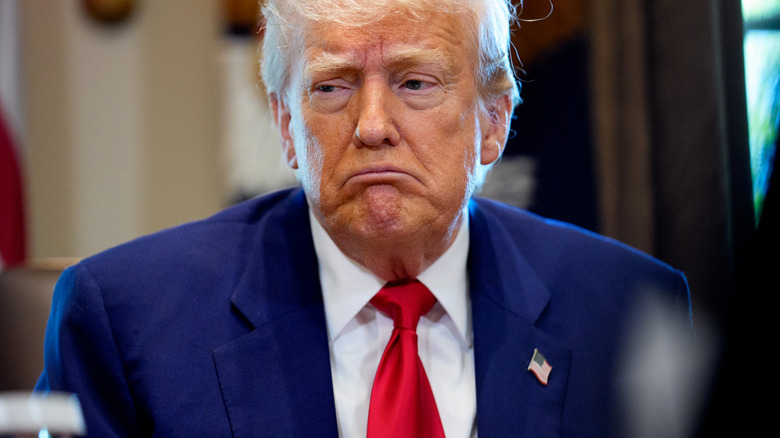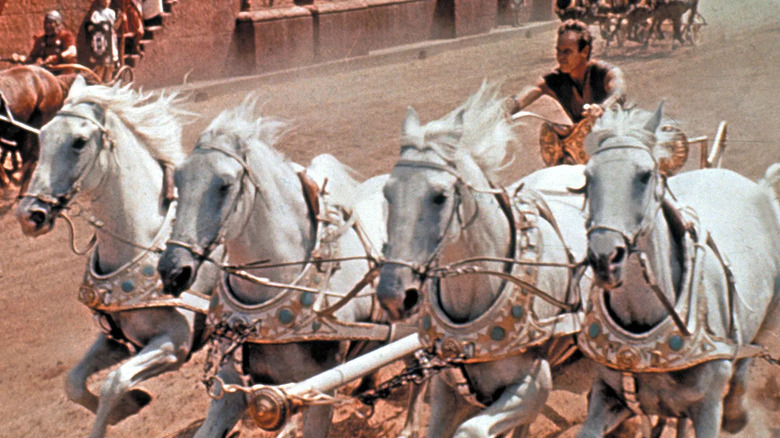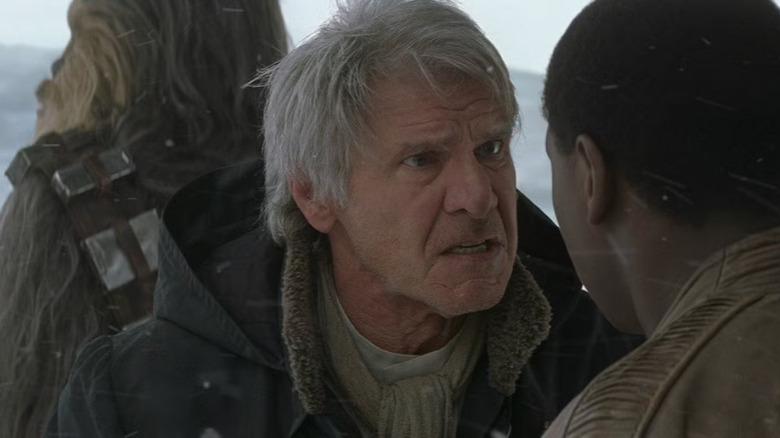Donald Trump Plans Tariffs On Films Shot Outside Of America – But It's Total Nonsense
President Donald Trump certainly had a lively Sunday. First, the official White House social media accounts celebrated Star Wars Day with an AI-generated image of Trump as a musclebound Sith Lord. After that, the president announced plans to convert Alcatraz island, which is currently a tourist attraction and national park, back into a functioning prison. Then, in a post on his Truth Social platform, Trump made a bizarre announcement of plans to implement "100% tariffs" on films shot outside of the U.S., declaring:
"The Movie Industry in America is DYING a very fast death. Other Countries are offering all sorts of incentives to draw our filmmakers and studios away from the United States. Hollywood, and many other areas within the U.S.A., are being devastated. This is a concerted effort by other Nations and, therefore, a National Security threat. It is, in addition to everything else, messaging and propaganda!
"Therefore, I am authorizing the Department of Commerce, and the United States Trade Representative, to immediately begin the process of instituting a 100% Tariff on any and all Movies coming into our Country that are produced in Foreign Lands. WE WANT MOVIES MADE IN AMERICA, AGAIN!"
Huh. The president of the United States labeling movies like "Woody Woodpecker Goes to Camp" (a Universal/Netflix production filmed in Australia) a "national security threat" certainly wasn't on my bingo card for the weekend.
While the announcement has sparked fears of potentially devastating effects on both Hollywood and overseas film production, it's actually completely nonsensical — and potentially impossible to implement.
Why Hollywood movies are filmed overseas
Speaking to C-SPAN on Sunday (via The Hollywood Reporter), President Trump claimed, "I've done some very strong research over the past week, and we're making very few movies now. Hollywood is being destroyed ... other nations have stolen our movie industry." It's true that the majority of U.S. films are filmed either partially or wholly overseas, but that's been the case for decades.
In the early days of filmmaking, Hollywood productions were largely contained within Los Angeles studio lots. Cameras were so large and temperamental that filming on location was a practical nightmare, and commercial air travel didn't start to become commonplace until the 1950s. As soon as avenues to the rest of the world opened up, though, Hollywood began to stretch its legs. William Wyler's 1959 religious epic "Ben-Hur" was mostly filmed in Italy, one of the first countries to offer government subsidies for film production. After that, the UK began offering tax relief for movie productions in 1992. Now, countries all over the world offer competing tax incentives to entice film productions. Individual US states do the same; Georgia, Louisiana, and Hollywood's home turf of California are among those offering the most generous tax credits for films.
It's a mutually beneficial exchange. Studios can spend hundreds of millions of dollars on movie productions, providing jobs for local film crews, funneling money into local businesses, and potentially driving tourism as well. On the studio side, a production can save a lot of money by shopping around for the country or state with the best tax incentives. Last year's "Furiosa: A Mad Max Story" was estimated to have received at least $183 million AUD in tax rebates from Screen Australia and the New South Wales government.
Of course, tax incentives aren't the only reason to film overseas: There's also the demands of the story. If you're making a movie with scenes in a medieval castle, you can either build a medieval castle from scratch in the U.S., or you can just go to one of the many medieval castles that have been preserved across Europe. The black volcanic sands of Iceland have often played the role of alien planets in sci-fi movies like "Interstellar" and "Prometheus," and the reason they look alien is because landscapes like that can't be found anywhere in North America. And in action franchises like "James Bond," "Mission: Impossible," and "Fast & Furious," globe-trotting to recognizable landmarks around the world (and sometimes destroying them) is a core part of the appeal.
A 'tariff' on movies makes no sense
The initial reaction of shock to Trump's tariff announcement soon gave way to a prevailing confusion as people asked, "How the hell would that even work?"
By definition, a tariff is a levy placed on the import of goods and is charged when they pass through customs. If you go on a Temu spending spree and buy a harness for your pet hamster or a pair of socks that make your legs look like chicken legs (both real items), those will need to be imported into the United States. In order for them to pass through U.S. customs, however, Temu must pay a levy, which is passed on to the customer at the time of purchase.
Film production, on the other hand, largely revolves around services rather than goods. By far the biggest expense in a movie budget is wages for the cast and crew. Other services — location rental, vehicle rental, music licensing, catering, accommodation — make up most of the rest. When goods are specifically purchased for filmmaking, like costumes or materials for set-building, they usually stay in whichever country they were purchased.
Trump's announcement of "a 100% Tariff on any and all Movies coming into our Country that are produced in Foreign Lands" would make sense if movies were a physical item, but they're not. They're intellectual property. These days, the dailies from a film shoot can be sent straight to the editing team via the internet rather than shipping physical hard drives. Even if a movie is shot on film in a country outside the U.S. and the film reels are shipped back to the United States, no transaction is taking place; the studio is simply moving its own property from one location to another.
Not only is it a logistical challenge to place a tariff on services, it would also open up the possibility of retaliatory tariffs from other countries. The U.S. is the biggest exporter of services in the world and currently has a huge trade surplus in services (amounting to $293 billion in 2024). Stymieing international trade of services could be a disaster for the U.S. economy — and for President Trump personally, since his lucrative cryptocurrency business falls under the banner of money services.
The threat of tariffs was dismissed by the office of California governor Gavin Newsom, whose senior adviser for communications, Bob Salladay, told Deadline:
"We believe he has no authority to impose tariffs under the International Economic Emergency Powers Act, since tariffs are not listed as a remedy under that law."
On Monday morning, the White House already appeared to be walking back the president's announcement. White House spokesman Kush Desai told The Hollywood Reporter that "no final decisions on foreign film tariffs have been made."


